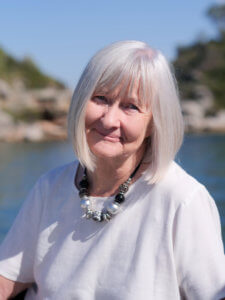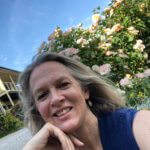‘Meticulous research adds credibility and prestige to the work.’

As author of many children and adults’ historical novels, most set in medieval England, Felicity Pulman’s ‘meticulous research’ usually involves getting herself in situ. She has travelled to England on numerous occasions, including spending a 3-month residency there, to follow the historical threads and trails which provide the milieu for her historical novels. In this HNSA interview, Felicity reveals what historical fiction means to her and how winning the ARA Historical Fiction Prize (which is now open for entries) might affect the lucky winner.
In your experience as a writer and reader of historical fiction, what is its particular appeal?
For readers, it’s an entertaining and painless way to learn about history. For writers, the research path is incredibly enjoyable as well as being interesting and instructive.
How do you think a prize such as the ARA Historical Novel Prize helps to raise the profile of historical fiction in general?
This is a very prestigious and generous prize. It’ll certainly attract the attention of local authors, publishers and readers, while reaching readers and writers worldwide.
What difference would it make to an author’s creative life to win a significant sum of prize money?
It would make a huge difference in that it would help authors visit the locations they need to research, which are often overseas, plus giving them quiet, creative time to immerse themselves in writing. It would also, of course, be a real confidence-booster!
Prize-money notwithstanding, what are the additional benefits of entering a high-profile writing competition for a published author?
For a start, it’s an incentive to complete a novel deemed worthy of entering the competition, while the prestige of winning, or even being short-listed, is tremendous. It will certainly lift the author’s profile considerably.
Which sub-genre of historical fiction are you pleased to see is eligible, and why do you feel it’s important?
I think it’s important that a wide range of sub-genres is included in the competition. It gives writers of historical fiction the freedom to explore different sub-genres, while giving readers of contemporary crime, fantasy and romance the chance to learn about the past. This is especially true of historical fiction for children and Y/A. Often a novel set in e.g. ancient Egypt, Rome, or the middle ages can ignite a life-long curiosity about the history of our world. Well-known Australian authors of various subgenres include Kerry Greenwood and Sulari Gentil (historical crime set in Australia); Isolde Martyn (historical romance set in the middle ages) and Sophie Masson, Juliet Marrilier and Kate Forsyth (historical fantasy.) Writers of YCA historical fiction include Wendy Orr, Pamela Rushby and past Children’s Laureate Jackie French. Some of my own novels for CYA cross several genres, and include time-slip Australian history (Ghost Boy and A Ring Through Time); time-slip fantasy (the Shalott trilogy) and medieval history/crime (The Janna Chronicles.)
What do you think makes a standout historical novel?
The author’s ability to make characters come alive and the setting as ‘real’ and believable as if the action were happening today. Meticulous research adds credibility and prestige to the work.
More about Felicity Pulman
Felicity Pulman is the award-winning author of numerous novels for children, teenagers and adults, including Ghost Boy, now under option for a movie and the basis of the popular Ghost Boytour at the Quarantine Station in Sydney.
Her novels reflect her interest in Arthurian legend, fantasy, crime and historical fiction encompassing medieval England and early Australia, including The Janna Chronicles, A Ring Through Time and Ghost Boy.
Felicity is an experienced presenter, talking to adults and students about researching and writing her novels and also conducting creative writing workshops. More can be found out about Felicity Pulman’s novels and her approach to writing historical fiction from her website and blog. Her most recent release is Day of Judgment, the sixth book in The Janna Chronicles.

This interview was compiled by HNSA Marketing Coordinator, Lou Greene. Lou was winner of the HNSA First Pages Pitch in 2017 and she long-listed in the Richell Awards. Last year, as well as being short-listed in the HNSA short story competition, she was a recipient of an ASA Mentorship Award. Lou has an MA Modern History and has recently completed a dual timeline, novel manuscript. Find out more about Lou’s writing from her website, or connect with her via Instagram or Twitter.

The ARA Historical Novel Prize, for published historical novels by Australian and New Zealand authors, will be worth $30,000 to the winning author. With entries opening on May 1, it is a partnership between generous sponsor, the ARA Group, and the Historical Novel Society Australasia (HNSA), in association with the New England Writers’ Centre. HNSA is delighted and proud to introduce this initiative, which celebrates the diversity and strength of an increasingly popular and acclaimed genre.




